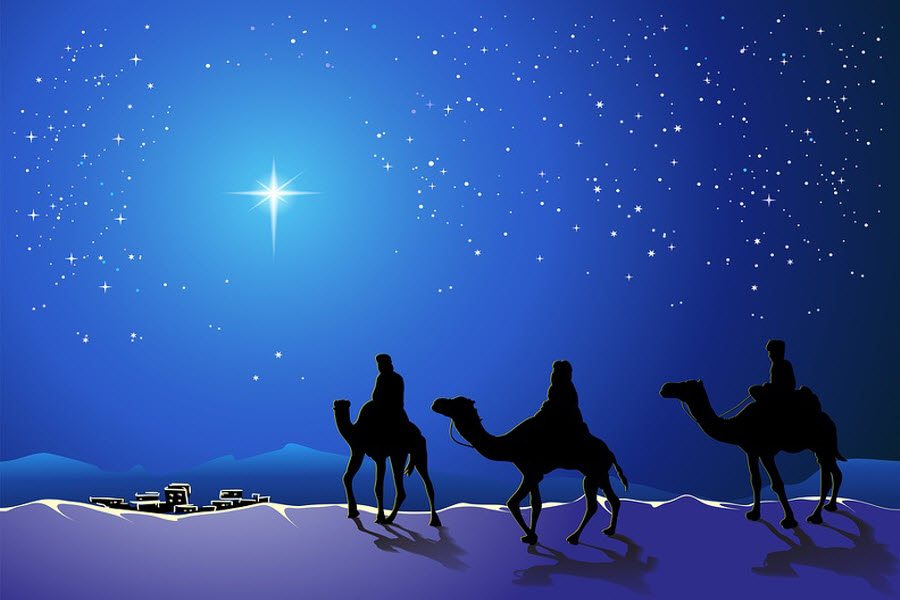Blog & Pastor Letters

The Epiphany of the Lord – January 7, 2024
01-07-2024Weekly ReflectionFr. Christopher TrummerToday’s feast of the Lord’s Epiphany celebrates the fulfillment of God’s original purpose for His chosen people. Recall God’s initial promise to Abraham: “I will make of you a great nation, and I will bless you and make your name great, so that you will be a blessing. [ . . . ] in you all the families of the earth shall be blessed” (Gen 12:2–3). In our first reading from Isaiah, we heard, “Nations shall walk by your light, and kings by your shining radiance.” The Lord also said through the prophet Isaiah, “It is too little for you to be my servant, to raise up the tribes of Jacob, and restore the survivors of Israel; I will make you a light to the nations, that my salvation may reach to the ends of the earth” (Isa 49:6).
God chose Israel in an exclusive way for the eventual purpose of drawing all peoples to Himself in an inclusive way. Israel was meant to become God’s “light to the nations,” revealing Him to the world. Despite this lofty vocation, Israel had remained essentially closed off to the world. Now, with the birth of Jesus Christ and the magi approaching him from the east, it is clear that this original plan of God was finally being fulfilled.
In modern English, we typically use the word “epiphany” to mean a sudden insight or intuition. It is generally a personal and private phenomenon. But the original meaning of epiphany is the public revelation or manifestation of something. The Epiphany of the Lord is the moment when Christ was revealed to the nations, the Gentiles, who are represented by the magi. Shortly after his birth, the shepherds had come to see him. As Jews, they represented the people of Israel acknowledging their Savior. But now, the magi seek him out and come to worship him. As non-Jewish foreigners, they already foreshadow the Gentiles who will later believe in him and be baptized.
Since most of us are Christians who descend from non-Jewish roots, it’s easy for us to take for granted that the Gentiles should be included. However, in our second reading from Ephesians, St. Paul says that the mystery of the Gentiles’ inclusion in God’s plan of salvation “was not made known to people in other generations,” and that it was “made known to [him] by revelation.” Despite Christ’s teachings about Gentiles and his encounters with them, it took special revelation to convince Paul, Peter, and the other disciples that the Gentiles were heirs of God’s promises.
There are a few spiritual laws on display in Matthew’s account of the visit of the magi. We could summarize them as: 1) those who seek God, find Him; 2) those who find Him, worship Him; and 3) those who worship Him, share Him.
Seek
God had said to the prophet Jeremiah, “You will seek me and find me, when you seek me with all your heart” (Jer 29:13). And Christ said, “Ask, and it will be given to you; seek, and you will find; knock, and it will be opened to you” (Lk 11:9). The Magi seek Christ using reason and faith. They ask, “Where is the newborn king of the Jews? We saw his star at its rising and have come to do him homage.” Like the magi who followed the star. we too experience God’s handiwork in nature. We can learn about Him indirectly through His creation. But nature is not God. Notice that the star did not lead the magi all the way to Jesus. They had to consult Sacred Scripture in order to find him. And of course, it was only by coming into his presence that they could worship him.
Find
“They were overjoyed at seeing the star and on entering the house they saw the child with Mary his mother.” The magi had assumed that Jesus would be in Jerusalem with the king and other “important” people. Instead, they found him in the lowest place: a manger, a feeding trough for animals.
Worship
“They prostrated themselves and did him homage. Then they opened their treasures and offered him gifts of gold, frankincense, and myrrh.” Today, all of us have been affected to some degree by consumerism. “What’s in it for me? What can I get out of this?” We do have real spiritual needs, but these questions miss the main point. The example of the magi reminds us that the center of worship is sacrifice — in other words, giving and not receiving.
Mission
“ . . . they departed for their country by another way.” We don’t know what became of the magi or what they did to share about their experience. But we do know that they were changed by their encounter with Jesus and that they followed God’s will by protecting Jesus from Herod.
Every Mass is a Christmas: The incarnate Christ becomes present again in humble form. And every time we come to Mass, it is an Epiphany: The Lord is revealed to us. We are to be like the magi: we seek the Lord, we find him here, we worship him by offering our gifts, and we leave as changed people.
BACK TO LIST